
Uganda’s Anti-LGBTQ Bill Threatens Tourism as Well as Lives
Ugandan LGBTQ rights activist Clare Byarugaba was looking forward to showing her country off to her French partner’s
2023-05-18 15:45

Derby £2 bus man plans two-and-a-half-day journey to Poland
"Bus adventurer" Andrew Cowell says he plans to use £2 buses and a coach to reach Krakow.
2023-05-18 13:54
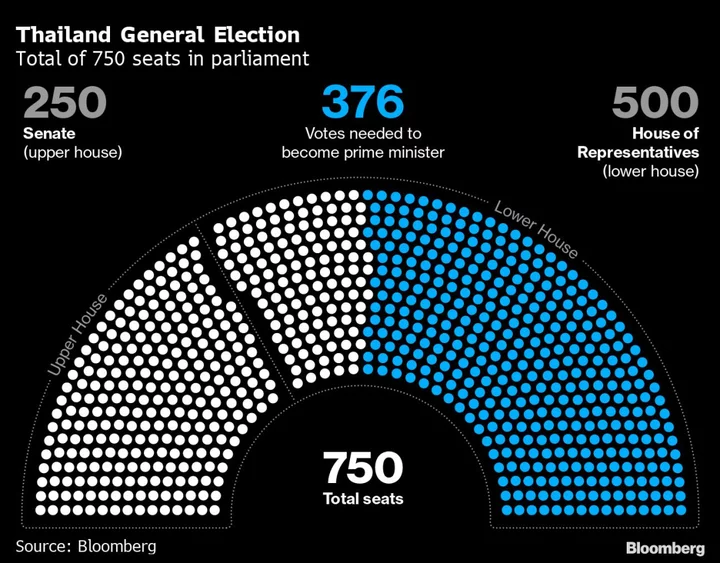
Thai Coalition on Course to Form Government, PM Candidate Says
A coalition of Thai pro-democracy parties, which swept Sunday’s election, is on course to form the next government,
2023-05-18 13:29
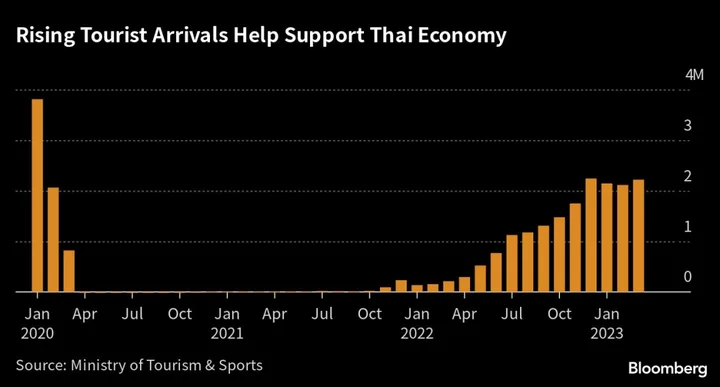
Tourism to Limit Thai Economic Pain as New Government Awaited
Thailand hasn’t been spared the political uncertainty that usually comes with elections, yet foreign tourists returning by the
2023-05-18 09:17

Republican-appointed federal judges grill FDA in mifepristone hearing
A combative three-judge panel at one of the most conservative courts in the country grilled attorneys for the federal government and a drug manufacturer as anti-abortion activists continue a legal battle to overturn the government’s approval of a widely used abortion drug. On 17 May, the case against mifepristone returned to the Fifth Circuit Court of Appeals in New Orleans, where attorneys for the US Department of Justice and drug manufacturer Danco Laboratories faced skeptical Republican-appointed judges hearing oral arguments in a case that could upend abortion care for millions of Americans. Within seconds of her opening argument, Justice Department attorney Sarah Harrington was interrupted by Judge James Ho, a Donald Trump appointee, who challenged her description of the legal challenge against the drug’s approval by the US Food and Drug Administration. “I don’t think there’s ever been any court that has vacated an FDA determination that a drug is safe to be on the market,” she replied. “FDA can make that determination based on exercising its own scientific expertise, but it’s not a court’s role to come in and second-guess that expertise.” “Why not focus on the facts,” Judge Ho said, “rather than this ‘FDA can do no wrong’ theme.” The judges repeatedly interrupted Ms Harrington and appeared sympathetic to the plaintiffs: an anti-abortion group represented by influential right-wing legal group Alliance Defending Freedom, whose senior counsel Erin Morrow Halley – the wife of Republican senator Josh Hawley – baselessly asserted that medication abortion is “particularly dangerous”. Judge Jennifer Walker Elrod, who was appointed by George W Bush, also took a moment to chastise lawyers for their “unusual remarks” in filings objecting to the widely derided lower-court decision from a former right-wing activist attorney who was appointed to the federal bench by Mr Trump. Judge Elrod suggested their criticisms amounted to personal attacks and suggested that the attorney retract the statements and apologise. “Those statements reflect our view that the district court was very outside the bounds,” said Jessica Ellsworth, an attorney for Danco. “I don’t think those remarks, any of them, were intended as any personal attack.” The judges are not expected to rule immediately. But a decision from the panel judges – each with a history of support for abortion restrictions – is likely to return the case to the US Supreme Court, which has paused any action on mifepristone until the legal challenge plays out. In her arguments, Ms Hawley conflated the risk of serious complications from mifepristone – which is less than 1 per cent – with the risk that a medication abortion failed and would then require medical attention. Her arguments suggested that doctors are enduring a moral harm by providing abortion care, without evidence that doctors have been forced to do so, while also claiming that the FDA illegally approved the drug when it was approved more than 20 years ago. The judges repeatedly questioned the FDA’s approval process for mifepristone, which plaintiffs argued was done too hastily through an expedited process that is typically reserved for treating serious or life-threatening illnesses. But the FDA did not do that with mifepristone; it took years of study before the FDA’s approval. The part of that process that the agency invoked for mifepristone’s approval allowed the FDA to add safety restrictions, such as a requirement that physicians be able to diagnose ectopic pregnancies. But judges appeared to argue that because pregnancy is not an illness, mifepristone should not have been approved through that process at all, repeating plaintiffs’ false claim that the FDA called pregnancy a “life-threatening illness.” “When we celebrated Mothers’ Day, were we celebrating illness?” Judge Ho said at one point. “The arguments today demonstrated in detail that the case has no legal or scientific merit and should have been laughed out of court from the very start,” Jennifer Dalven, director of the ACLU Reproductive Freedom Project, said in a statement. “Unfortunately, the deck is stacked as the judges hearing this case are well known for their extraordinary hostility to abortion,” she added. “The whole point of the case is to prevent anyone in America, no matter where they live, from using a medication that has been safely used in this country for decades and is used in most abortions today.” Major medical groups and research from hundreds of studies over the last two decades have confirmed the overwhelming safety and efficacy of the drug, one of two drugs used in a two-drug protocol for a medication abortion, the most common form of abortion care in the US. Studies show it is as safe to use as common over-the-counter pain relievers like ibuprofen and acetaminophen, and the protocol for medication abortion is used in more than 60 other countries. The drug was first approved by the FDA in 2000 and is approved for use up to 10 weeks of pregnancy. A vast majority of abortions occur within the first nine weeks of pregnancy. From 2019 through 2020, nearly 93 per cent of all abortions were performed before the 13th week, according to the US Centers for Disease Control and Prevention. Mifepristone is also used to treat miscarriages. Roughly 10 per cent of clinically recognised pregnancies end in miscarriages, according to the American College of Obstetricians and Gynecologists. The American College of Obstetricians and Gynecologists and the American Medical Association also joined a brief in the challenge opposing arguments from anti-abortion groups. Last year, Alliance Defending Freedom filed a lawsuit in US District Court in Amarillo, Texas on behalf of a group of anti-abortion activists incorporated as the Alliance for Hippocratic Medicine, which was organised that same month with an address in Amarillo. The Alliance Defending Freedom also led the challenge at the Supreme Court that ultimately struck down Roe v Wade. In April, US District Judge Matthew Kacsmaryk – a former right-wing activist lawyer who was appointed to the federal judiciary by then-President Trump – issued a ruling to suspend the FDA’s approval of mifepristone, which was immediately challenged by abortion rights advocates, providers, major medical groups, drug manufacturers and the Biden administration. An appeal landed at the Fifth Circuit court, which has jurisdiction over the Amarillo court. A three-judge panel blocked a part of the judge’s ruling, and a subsequent ruling at the Supreme Court paused the lower-court ruling as the legal challenge continues. Read More North Carolina Republicans approve 12-week abortion ban as sweeping restrictions spread across US South Nebraska Republicans approve combined gender-affirming care ban and anti-abortion bill after epic filibuster Anti-abortion laws harm patients facing dangerous and life-threatening complications, report finds A Texas man sued his ex-wife’s friends for allegedly helping her with an abortion. Now they’re suing him Louisiana Republicans refuse rape and incest exceptions to state’s sweeping anti-abortion law What is mifepristone? The widely used pill in the abortion rights battle at the Supreme Court
2023-05-18 06:21
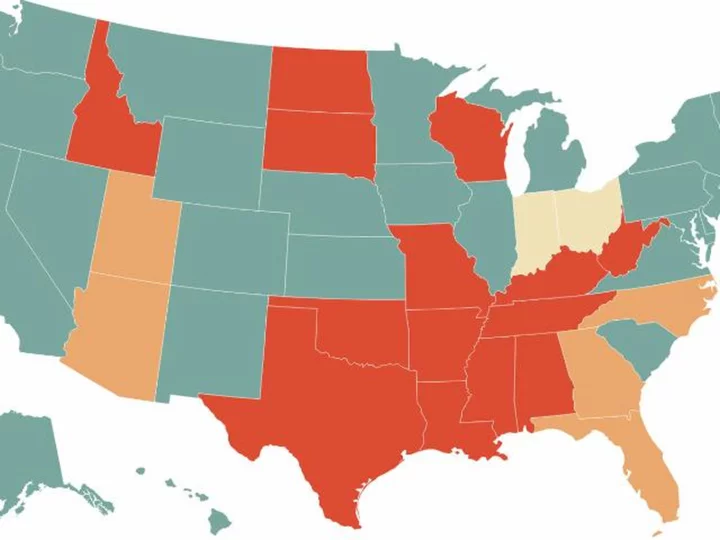
The abortion access map is being dramatically redrawn this week
The evolving patchwork of access to abortion care is going through big changes this week, with the entire Southeast on the brink of imposing new limits.
2023-05-18 02:20

North Carolina Republicans approve 12-week abortion ban as sweeping restrictions spread across US South
Republican lawmakers in North Carolina voted to override the governor’s veto of a bill that outlaws abortion at 12 weeks of pregnancy, restricting abortion access in a state that has been a haven for abortion care in the year after the US Supreme Court’s decision to reverse Roe v Wade. In neighbouring South Carolina, lawmakers have continued debate before voting on a more-restrictive measure that would ban nearly all abortions after roughly six weeks of pregnancy, before many people know they are pregnant, adding to a streak of abortion restrictions across the US South. More than a dozen states, mostly in the South, have outlawed most abortions or severely restricted access within the year after the Supreme Court’s ruling in Dobbs v Jackson Women’s Health Organization, which revoked a constitutional right to abortion care that was affirmed for nearly half a century. Abortion rights restrictions in North Carolina and a six-week ban in South Carolina would dramatically change the map for abortion access in the US, where abortions are banned in most cases from Texas to West Virginia and along the Gulf Coast. “In the more than a dozen states with bans, women have been turned away from emergency rooms, left with no choice but to travel hundreds of miles for the care they need, and faced complications that put their lives and health at risk. Like those laws, the North Carolina ban will harm patients and threaten doctors for providing essential care,” White House press secretary Karine Jean-Pierre said in a statement on 17 May. She called the North Carolina measure a “dangerous bill that is out of touch with the majority of North Carolinians and will make it even more difficult for women to get the reproductive health care they need.” “We’ve already seen the devastating impacts that state abortion bans have had on the health and lives of Americans living under these draconian laws,” she added. Health workers joined protesters at the North Carolina Capitol in Raleigh on 17 May as lawmakers in the Republican-controlled state legislature convened to override a veto from Democratic Governor Roy Cooper, who has spent the last several days campaigning for GOP lawmakers to break from the party and drop the challenge to his veto. In a video posted online, the governor named four Republican lawmakers who he said made campaign promises to protect access to abortion. “They say this is a reasonable 12-week ban. It’s not,” he said in the video. “The fine print requirements and restrictions will shut down clinics and make abortion completely unavailable to many women at any time, causing desperation and death.” Much of the coverage surrounding the North Carolina legislation has centred around a now-Republican lawmaker who previously campaigned against abortion restrictions when she was a Democrat, up until April. State Rep Tricia Cotham joined the Republican Party last month after campaigning for her seat as a Democratic candidate and earning the endorsement of EMILY’s List, an influential abortion rights organisation. Her party switch delivered Republicans a veto-proof majority in the House. Ms Cotham has spent years campaigning against abortion restrictions, with powerful testimony about abortion rights and her own medically necessary abortion experience, saying in one widely shared 2015 speech that “my womb and my uterus is not up for your political grab.” In a statement following the vote, the governor said that “North Carolinians now understand that Republicans are unified in their assault on women’s reproductive freedom, and we are energized to fight back on this and other critical issues facing our state.” Lawmakers in the House and Senate voted on party lines to reverse the governor’s veto. The bill includes exceptions for pregnancies from rape or incest or if there is a “life-limiting anomaly” in the fetus. It also will require in-person physician visits at least 72 hours before a procedural abortion, and doctors must also make real-time views of fetuses available and allow patients to listen to embryonic cardiac activity. North Carolina lawmakers approved the anti-abortion law while lawmakers in Nebraska debated a measure that coupled a 10-week abortion ban with a bill targeting gender-affirming care for trans youth, a proposal that inspired a nearly three-month-long filibuster in an effort to block it. Republican lawmakers ultimately broke through the filibuster on Tuesday night and voted in favour of the combined bill, which will head to a final round of votes before it heads to the desk of Republican Governor Jim Pillen, who intends to sign it into law. Meanwhile, in Louisiana, lawmakers recently refused to add rape and incest exceptions to its anti-abortion law, one of the most restrictive in the country. State lawmakers also overwhelmingly rejected attempts to clarify medical exceptions in the law, including a measure that would specifically allow providers to remove an ectopic or molar pregnancy, which cannot result in a successful birth. Read More Nebraska Republicans approve combined gender-affirming care ban and anti-abortion bill after epic filibuster Anti-abortion laws harm patients facing dangerous and life-threatening complications, report finds
2023-05-17 23:51

Trump takes credit for overturning of Roe v Wade while raising questions about DeSantis’ six-week ban
Former president Donald Trump is taking credit for the US Supreme Court overturning Roe v Wade last year by claiming he nominated the justices who did not agree with the 1973 precedent. On Tuesday night’s episode of Rob Schmitt Tonight on Newsmax, Mr Trump compared his action against abortion to Florida Governor Ron DeSantis’, saying he has done more for pro-life people. “First of all, I’m the one that got rid of Roe v. Wade and everybody said that was an impossible thing to do,” Mr Trump boasted. Mr DeSantis recently signed into law a six-week ban that prevents anyone from seeking an abortion after six weeks of gestation, with the exception of cases where ending a pregnancy would save the mother’s life. As of now, Florida allows abortions for pregnancies involving rape or incept until 15 weeks of gestation, so long as the mother can provide documentation such as a restraining order or police report. But despite Florida’s harsh move to restrict abortion access, Mr Trump believes he should be receiving more credit for the work he’s done. “What I’ve done is given the pro-life people, who are wonderful people and loving people, I’ve given them the power of negotiation. Because now they’re able to negotiate something that is going to be very important,” Mr Trump said. During his presidential term, Mr Trump nominated three Justices to the Supreme Court - Neil Gorsuch, Brett Kavanaugh and Amy Coney Barrett. All three Justices joined the majority opinion of Dobbs v Jackson last summer to help overturn Roe v Wade as well as Planned Parenthood v Casey. This returned the legality of abortions to each state individually. As of May 2023, 19 states have banned abortions either fully or restricted until a certain week of gestation, including Florida. “DeSantis, or Ron Desanctimonious as I call him, he came out with the six weeks — other people agree with and a lot of people don’t,” Mr Trump said. The former president used Mr DeSantis’ recent ban to highlight how unpopular he is with female voters — indicating the ban is too restrictive. “Ron, if you take a look, he’s losing women voters like crazy,” Mr Trump said before citing several news stories about Mr DeSantis’ unpopularity with women. The former president has been comparing himself positively to Mr DeSantis in the last few months as rumours are swirling that Mr DeSantis is preparing to announce his bid for Republican presidential candidate. “I don’t do it for the women, for the men, I do what’s right,” Mr Trump added. It is thought that Mr DeSantis could be a leading contender for Republicans, making him a possible threat to Mr Trump’s campaign. As of recently, any opportunity Mr Trump has to criticise Mr DeSantis, he takes it — as evidenced by the Newsmax interview. Mr Trump both credited himself with overturning Roe v Wade while asserting that Mr DeSantis was unpopular with women due to Florida’s six-week ban. Mr Trump has changed his opinion on abortion throughout his life. In the 1990s the former president claimed he was pro-choice but by 2015 he told reporters he was pro-life. In 2016, Mr Trump said he would have “preferred” if abortion were up to the States but accepted the federal law. After implementing the three Justices who overturned Roe v Wade last year, Mr Trump took credit for the decision. But since then, the former president has never made it clear at what point in gestation abortions should be illegal. Read More DeSantis reacts to Trump implying Florida abortion ban is ‘too harsh’ as 2024 fight heats up Abortion after 12 weeks banned in North Carolina after GOP lawmakers override governor’s veto Abortion pill case moves to appeals court, on track for Supreme Court Ivanka and Jared split over attending Trump 2024 launch – follow live Why was Donald Trump impeached twice during his first term? Four big lies Trump told during his 2024 presidential announcement
2023-05-17 22:58
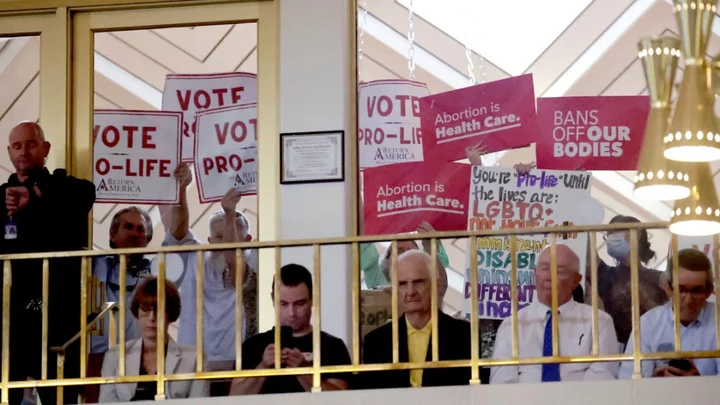
Key abortion debates this week in US courts and statehouses
Abortion opponents are trying again to implement restrictions in the latest round of court and legislative action on the divisive issue. This round of efforts centers on states that have considered bans before and a policy that's been bouncing around federal courts. Here are key things to know about the latest developments in the saga of how abortion policy will settle after the U.S. Supreme Court last year overturned Roe v. Wade and the nationwide right to abortion. PURPLE STATE POLICY Since the Dobbs ruling last year, tighter abortion restrictions have been enacted in most Republican-controlled states and protections of abortion access have gone into effect in most that are dominated by Democrats. But there hasn't been such a uniform story in the 11 states with divided government control. Virginia has kept its status quo, for instance, while Vermont has adopted a constitutional amendment to preserve abortion access and Louisiana and Kentucky have bans in place. Change came quickly in North Carolina in April when one state lawmaker flipped from Democrat to Republican, giving the GOP enough votes to override gubernatorial vetoes. Lawmakers promptly passed a ban that's less restrictive than most — allowing abortion for the first 12 weeks of pregnancy, which would be among the least restrictive of the new bans. Democratic Gov. Roy Cooper vetoed it. But lawmakers on Tuesday overrode that veto and the new law is set to take effect July 1. TRYING AGAIN ON BANS IN NEBRASKA, SOUTH CAROLINA Nebraska and South Carolina are both Republican-dominated states where GOP lawmakers have struggled to agree on the details of abortion bans. Both are considering bans this week, just weeks after earlier efforts narrowly fell short on procedural votes. And both have resurrected legislation that's less restrictive than versions that were rejected previously. In South Carolina, Republican lawmakers were divided on whether to ban abortion at all stages of pregnancy or only after cardiac activity can be detected — generally around six weeks, often before women know they're pregnant. A version of a less stringent ban is now under consideration. In Nebraska, lawmakers balked at a ban after six weeks. The unique unicameral legislature is now considering a ban on abortion at 12 weeks' gestation. It's been added to a bill that would also ban gender-affirming care for minors. RESTRICTION IN MONTANA In Montana, Gov. Greg Gianforte signed a ban Tuesday on dilation and evacuation abortions, which are normally performed in the second trimester of pregnancy. A legal challenge is expected. And it wouldn't be the first challenge on the policy in the state. A judge ruled last month that she would not block the ban preemptively, before it was signed into law. The state in 2021 adopted a broader ban on abortions after 20 weeks of pregnancy, but the state Supreme Court ruled that it will not enforce it pending a court challenge, leaving abortions by some means legal until viability, around the 24th week. COURT ARGUMENTS ON AN ABORTION PILL Most of the legal battles on abortion since the Supreme Court’s Dobbs decision in 2022 have centered on whether individual state constitutions protect the right to abortion. But one has implications nationally. An anti-abortion group sued seeking to rescind the U.S. Food and Drug Administration’s 2000 approval of mifepristone, one of two drugs used in combination in most medication-induced abortions in the U.S. A federal judge in Texas agreed. The New Orleans-based 5th U.S. Circuit Court of Appeals is hearing arguments Wednesday on the matter. In the meantime, the U.S. Supreme Court has said that mifepristone can remain on the market. It is already barred from being used in abortions, with some exceptions, in states with bans in place. An immediate response from the circuit court is unlikely. The case is expected to return to the nation’s top court eventually. The Texas-based case could be merged with one in Washington, where another federal judge ruled last month that mifepristone restrictions cannot be rolled back in a group of Democrat-led states that filed lawsuits. Read More Ukraine war’s heaviest fight rages in east - follow live Charity boss speaks out over ‘traumatic’ encounter with royal aide Arab foreign ministers welcome Syria's return to the Arab League ahead of Jeddah summit Hamas calls on Palestinians to confront Israeli victory parade in Jerusalem Tiny Amerindian village in Guyana fights gold mine in key court battle over indigenous land rights
2023-05-17 22:56

Abortion Pill Ban Gets a Second Chance in Appeals Court
The nationwide abortion-pill ban ordered by a Texas federal judge last month but partially stayed by the US
2023-05-17 22:52
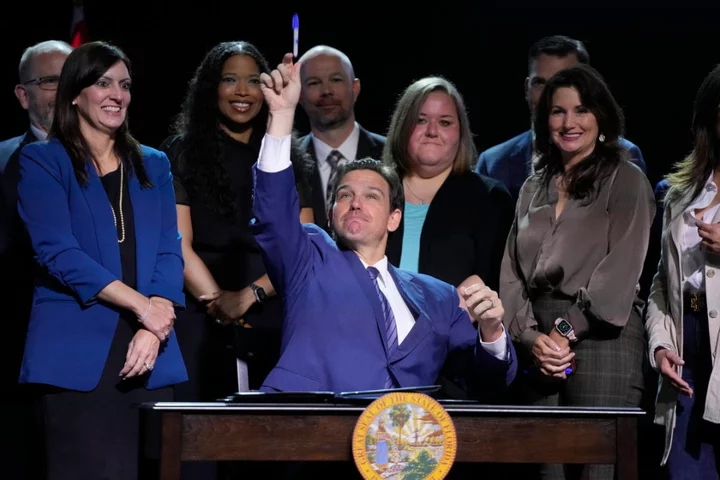
DeSantis reacts to Trump implying Florida abortion ban is ‘too harsh’ as 2024 fight heats up
Gov Ron DeSantis criticised Donald Trump on Tuesday for implying Florida's new six-week abortion ban is “too harsh,” stepping up his attacks on the former president as he prepares to challenge him for the 2024 Republican nomination. Mr DeSantis was responding to a question about Mr Trump's comments in an article published Monday by The Messenger about the six-week ban the Florida governor recently signed into law. “Many people within the pro-life movement feel that that was too harsh,” Trump told the online outlet. Mr DeSantis contended the law has widespread support among opponents of abortion and noted the former president didn't say what limits he would back on the procedure. “Protecting an unborn child when there’s a detectable heartbeat is something that almost 99 per cent of pro-lifers support,” Mr DeSantis said at a news conference in Florida, taking questions after he signed a measure to combat human trafficking. “As a Florida resident, you know, he didn’t give an answer about, ‘Would you have signed the heartbeat bill that Florida did, that had all the exceptions that people talk about?’” Mr DeSantis added. The rivalry between Mr Trump and Mr DeSantis is heating up as the Florida governor nears a decision on a 2024 presidential bid. Mr DeSantis allies believe he will launch his candidacy as soon as this week, although an announcement could come closer to the end of the month. Abortion has been an early flashpoint in the still-forming Republican primary field ahead of the first presidential election since the Supreme Court overturned Roe v Wade. The bickering showcases the GOP's ongoing internal debate over hard-line abortion restrictions, which may be popular in a Republican primary but could create problems in a general election for the party's eventual nominee. The bill signed into law last month by Mr DeSantis would ban abortions after six weeks of pregnancy. It will take effect only if the state’s current 15-week ban is upheld in a legal challenge before the state Supreme Court, which is controlled by conservatives. “Ron DeSantis is flailing in the polls and is closer to the bottom of the pack than he is to President Trump, who is dominating in every single poll,” Trump campaign Steven Cheung said when asked to respond to DeSantis' remarks. Cheung pointed out an anti-abortion group's recent characterization of Trump's presidency as “the most consequential in American history for the pro-life cause.” Mr Trump has referred to himself as “the most pro-life president in American history,” as his three nominations of conservative judges to the Supreme Court paved the way for the end of legalized abortion nationwide. But in the early months of his 2024 bid, Mr Trump has often sidestepped the issue of abortion, even as Republicans across the country celebrate the Supreme Court decision stripping federal constitutional rights to the practice. In Iowa in March, he repeatedly refused to say whether he would support a federal law restricting abortion in every state — a move that anti-abortion activists have been demanding of the GOP’s presidential contenders. “We’re looking at a lot of different things," he said when asked by The Associated Press whether he supports a federal abortion ban. Last week during a primetime CNN town hall in New Hampshire, Mr Trump continued to avoid specifics on a national ban, repeatedly saying he would “do what’s right,” without specifying what that was. As he gets closer to an announcement, Mr DeSantis has been escalating his criticism of Mr Trump, who for months has been attacking him directly and through groups supporting his candidacy. Last week in Iowa, as perilous weather sidelined Mr Trump’s trip to the state, Mr DeSantis highlighted the GOP’s recent string of electoral losses — a clear knock on the former president. “We must reject the culture of losing that has impacted our party in recent years. The time for excuses is over,” Mr DeSantis said at an event in Sioux Center. “If we get distracted, if we focus the election on the past or on other side issues, then I think the Democrats are going to beat us again.” Read More Trump news – live: John Durham’s report on Trump-Russia probe attacks FBI as Giuliani accused of sexual abuse Oral sex on Trump calls and pardons for sale: The most disturbing allegations from the Giuliani lawsuit Disney asks judge to dismiss DeSantis-appointed board's lawsuit in latest tit-for-tat Ukraine war’s heaviest fight rages in east - follow live Charity boss speaks out over ‘traumatic’ encounter with royal aide
2023-05-17 22:26
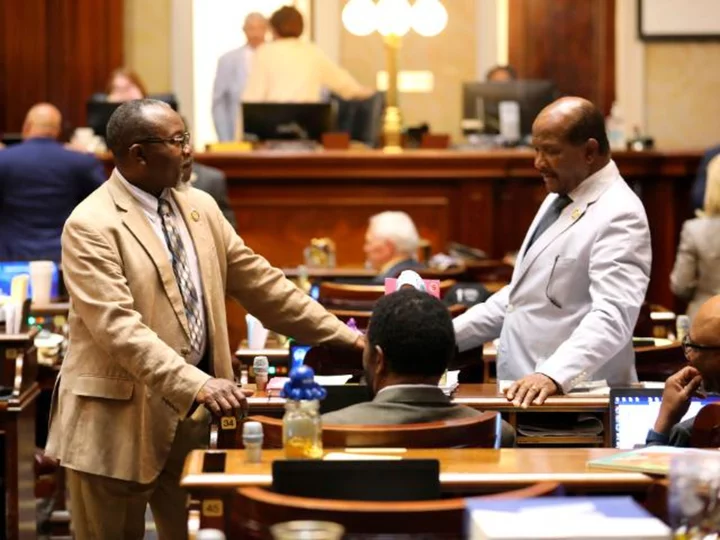
Abortion debate in South Carolina legislature stretches into second day
Lawmakers in South Carolina will reconvene Wednesday morning after debating for more than 12 hours on a bill that would ban most abortions as early as six weeks into pregnancy.
2023-05-17 21:22
